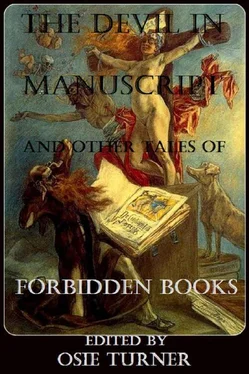“In what way?” I asked.
“Because a successful portrait painter—bear in mind that I am speaking from the commercial, worldly standpoint when I say successful—must be nothing more or less than a beauty doctor. Men and women do not wish to be painted as they are, but as they think they are. Flatter them cleverly enough, and you’ll soon become what the world considers a successful artist. What a soul-stirring vocation! Your watchword through life shall be: “When I touch my patron’s vanity I also touch his pocketbook.”
“I’ll never do that—not if I have to starve first!” I cried angrily.
But Martin only smiled unpleasantly and picked up his suitcase. With a curt nod, he turned and strode out of the room. A moment late I heard the outer door slam. He had gone.
That same week Martin sailed for home. He left behind him his gruesome paintings which he bequeathed to me in a sarcastic note. I immediately removed those grisly masterpieces and hung up in their place some of my own work. At the time I was living a trifle beyond my means; and so, when I received what I then considered a handsome offer from Emile Verone for my roommate’s morbid creations, I was glad enough to accept it. Of course I intended paying Martin the price I received for them at some future date—a date which, unfortunately, never materialized. These same paintings, I now understand, hang in the Louvre and are worth their weight in gold.
After Martin had left Paris, I began to look around for another roommate who would share my expenses. One evening, as luck would have it, I happened to run into an old acquaintance at the Follies Bergere. He had wandered to Paris alone to amuse himself and was delighted at the prospect of living with a former college friend who knew the ropes.
Wilbur Huntington was a plump young man who had made quite a reputation for himself at the university. No one had ever caught him in the act of opening a hook, yet he had always glided smoothly through the examinations. He was an anomaly to the professors who claimed that success required effort. His half shut, sleepy, brown eyes, his bland smile, his round, expressionless face, quite belied the man’s intelligence. Although he was lazy to a fault, his mind was as keen as a knife which had just visited the grindstone. I have never met his equal as a psychologist.
I was lucky to have fallen in with him. He came of a very wealthy New York family, who gave him a lavish income—an income which he was not slow in spending. Money meant little or nothing to him. During the months we roomed together we lived like fighting cocks.
There was nothing Huntington liked better than to fill our studio with Emile Verone’s pupils and discuss art. He would start the ball rolling with some tidbit of knowledge which he had picked up; start it rolling, and then sink back comfortably on the lounge, close his narrow-lidded eyes and smile blandly at the ceiling. He liked to hear the maniacs rave, as he expressed it. In the Latin Quarter he was called “Le Cochon d’Inde.” They facetiously brought him offerings of lettuce leaves which he devoured solemnly and rapaciously. The man’s appetite was amazing.
With such a companion, the months sped by merrily. Occasionally I received a letter from home. It seemed that Paul had reformed, and that this reformation had been brought about through Martin. Apparently my former roommate had sought him out immediately on his return to America and had once more succeeded where others had failed. The letter, which informed me of this, was written by my mother. It ran as follows:
My Dear Son: You will be glad to know that Paul has given up drinking. What a relief this has been to your father and me! We have been so worried about him since you left home! But now everything seems to be all right.
We owe Paul’s reformation to your friend, Mr. Martin. He has a remarkable influence over the boy. And yet, somehow, I can’t bring myself to like him. When he is in the room, I always feel as though I had a precious secret which I must keep from him at all cost. This is absurd, of course.
My dear boy, I am glad that you are getting along so well in your studies! I hope you will come home soon. Father has not been in good health lately. I believe he has been worrying over business affairs. Lovingly,
Mother.
At the time I did not give much heed to the last few lines of my mother’s letter. Father had always been such a strong, robust man that I could not imagine him sick. Death and failure seemed quite remote from him. And so, when I received a letter from Paul two months later, I was quite unprepared for what it had to tell me. The news which it contained was like a bolt from the blue. I quote it here:
Dear Charley: Come home at once. Father died this morning, and we need you. Only yesterday I learned that the firm had failed. Would write more, but mother is calling. Hurry home. Affectionately,
Paul.
“What’s the trouble?” Huntington asked. He had come into the studio unnoticed and now stood at my elbow. What’s the trouble?” he repeated. “You’re as white as a ghost.”
I tried to answer him but couldn’t. Something clicked in my throat like a clock running down. I handed him the letter in silence.
“I don’t know what to say,” he muttered a moment later. “I’m awfully sorry, Charley. I want you to know that.” He offered me his plump hand boyishly.
But I did not see it. There were weak, womanly tears in my eyes. Father was dead—not only dead but ruined! I had pictured to myself two more years in Paris and then a luxurious studio in New York; and now these air castles had crumbled in an instant. But what a selfish brute I was! Father had just died, and I was already thinking of myself. Martin had been right in his estimate of me.
“The Marseillaise sails to-morrow,” Huntington said. “I’ll hustle down and get our staterooms reserved.”
“But surely you’re not going to leave Paris?” I murmured. “I can make it all right by myself.”
Huntington smiled sleepily. “Don’t you worry about that,” he answered. “I’m sick of Paris. When you go, I go. Besides, as you know, queer birds are my hobby; and I’m rather anxious to meet this chap, Martin, of whom you have told me so much.”
On the following day we took passage for New York. The ocean was rather rough for that time of year; to my natural depression were added the qualms of seasickness. But on that trip I learned the true worth of the plump, sleepy man whom my associates of the Latin Quarter called “Le Cochon d’Inde”. He was indefatigable in his efforts to cheer me up.
I found affairs at home even worse than I had imagined. My father had died a bankrupt. He had left nothing except the house which was heavily mortgaged and several debts incurred during his illness. These bills, added to the natural grief attending his death, had aged my mother at least ten years. I had, indeed, come home at the right moment if I could help.
My one pleasant surprise was Paul. He had matured considerably in the last few years. I found him looking splendidly—a handsome, capable fellow, if there ever was one. On the first night of my homecoming we had a long talk together after mother had gone to bed.
“They tell me you’re not drinking any more, Paul t” I said casually.
“No,” he answered with a grim smile. “I’m through with that stuff for good. Martin cured me.”
“How did he go about it,” I asked.
“Oh, he showed me a few examples of what it could do to a fellow. You see he’s living in the slums these days, and he has lots of opportunity to study drunks in their last stages.”
“In the slums! Why does he live there?”
“He’s gathering material for a book on murder—studying the criminal types close up. He says it pays to get first-hand knowledge of a subject. When I begin practicing law, he’ll send me a lot of clients.”
Читать дальше












